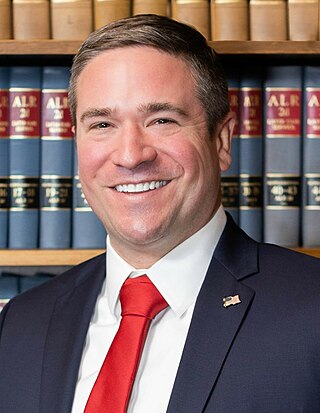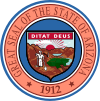
The False Claims Act of 1863 (FCA) is an American federal law that imposes liability on persons and companies who defraud governmental programs. It is the federal government's primary litigation tool in combating fraud against the government. The law includes a qui tam provision that allows people who are not affiliated with the government, called "relators" under the law, to file actions on behalf of the government. This is informally called "whistleblowing", especially when the relator is employed by the organization accused in the suit. Persons filing actions under the Act stand to receive a portion of any recovered damages.
In common law, a writ of qui tam is a writ through which private individuals who assist a prosecution can receive for themselves all or part of the damages or financial penalties recovered by the government as a result of the prosecution. Its name is an abbreviation of the Latin phrase qui tam pro domino rege quam pro se ipso in hac parte sequitur, meaning "[he] who sues in this matter for the king as well as for himself."

Samuel Pearson "Terry" Goddard III is an American attorney and politician who served as the mayor of Phoenix, Arizona from 1984 to 1990 and as the 24th attorney general of Arizona from 2003 to 2011. He is a member of the Democratic Party.
The National Association of Attorneys General (NAAG) is a 501(c)(3) nonprofit organization of state and territory attorneys general in the United States which therefore means that the United States Attorney General in the federal government is not a member.

Lori Swanson is an American lawyer and politician who served as the attorney general of Minnesota from 2007 to 2019. She was the first female attorney general elected in Minnesota. In 2018, she ran for Governor of Minnesota with running mate U.S. Representative Rick Nolan finishing in third place in the Democratic-Farmer-Labor primary.

The Office of the Missouri Attorney General was created in 1806 when Missouri was part of the Louisiana Territory. Missouri's first Constitution in 1820 provided for an appointed attorney general, but since the 1865 Constitution, the Attorney General has been elected. As of January 2023, there have been 44 attorneys general in Missouri.

The Indiana Attorney General is the chief legal officer of the State of Indiana in the United States. Attorneys General are chosen by a statewide general election to serve for a four-year term. The forty-fourth and current Attorney General is Todd Rokita.

Medicis Pharmaceutical is a medical cosmetics company based in Bridgewater, New Jersey. It is a subsidiary of Valeant Pharmaceuticals, which acquired the company in 2012. Medicis is known for products such as Solodyn and Ziana for treating acne, and for Restylane and Dysport for treating facial wrinkles.
Bates v. State Bar of Arizona, 433 U.S. 350 (1977), was a United States Supreme Court case in which the Court upheld the right of lawyers to advertise their services. In holding that lawyer advertising was commercial speech entitled to protection under the First Amendment, the Court upset the tradition against advertising by lawyers, rejecting it as an antiquated rule of etiquette.
Consumer protection is the practice of safeguarding buyers of goods and services, and the public, against unfair practices in the marketplace. Consumer protection measures are often established by law. Such laws are intended to prevent businesses from engaging in fraud or specified unfair practices to gain an advantage over competitors or to mislead consumers. They may also provide additional protection for the general public which may be impacted by a product even when they are not the direct purchaser or consumer of that product. For example, government regulations may require businesses to disclose detailed information about their products—particularly in areas where public health or safety is an issue, such as with food or automobiles.

Thomas Charles Horne is an American politician, attorney, businessman, and activist who has served as the Arizona Superintendent of Public Instruction since 2023 and previously from 2003 to 2011. A member of the Republican Party, he was Attorney General of Arizona from 2011 to 2015. Horne ran for reelection as Attorney General but lost to Mark Brnovich in the 2014 Republican primary.
Nationwide Asset Services was a US-based privately owned debt settlement company based both Phoenix, Arizona and Sacramento, California. The company was also affiliated with several other firms that provide nearly identical services and their own separate websites including American Debt Arbitration, Universal Nationwide and Universal Debt Reduction. The company faced law suites in a number of states which resulted in it being barred from providing debt settlement services in those states. It was shut down in 2015.
Diamond Resorts is a wholly owned subsidiary of Hilton Grand Vacations. Diamond Resorts was an independent timeshare and vacation ownership company until it was purchased by HGV in 2021. Following the purchase, Diamond's resorts became part of HGV's resort portfolio, and Diamond itself became a brand and subsidiary of HGV. The majority of Diamond Resorts have been or will be rebranded as Hilton Vacation Club properties, however the original brand will continue to exist as some resorts are slated to retain the Diamond Resorts name.
Theranos Inc. was an American privately held corporation that was touted as a breakthrough health technology company. Founded in 2003 by then 19-year-old Elizabeth Holmes, Theranos raised more than US$700 million from venture capitalists and private investors, resulting in a $9 billion valuation at its peak in 2013 and 2014. The company claimed that it had devised blood tests that required very small amounts of blood and that could be performed rapidly and accurately, all using compact automated devices that the company had developed. These claims were proven to be false.

Elizabeth Anne Holmes is an American biotechnology entrepreneur who was convicted of fraud in connection with her blood-testing company, Theranos. The company's valuation soared after it claimed to have revolutionized blood testing by developing methods that needed only very small volumes of blood, such as from a fingerprick. In 2015, Forbes had named Holmes the youngest and wealthiest self-made female billionaire in the United States on the basis of a $9-billion valuation of her company. In the following year, as revelations of fraud about Theranos's claims began to surface, Forbes revised its estimate of Holmes's net worth to zero, and Fortune named her in its feature article on "The World's 19 Most Disappointing Leaders".

Mark Brnovich is an American attorney and politician who was the 26th Attorney General of Arizona from 2015 to 2023. A member of the Republican Party, he was an unsuccessful candidate for its nomination in the 2022 U.S. Senate election in Arizona. He is married to Susan Brnovich, a United States district judge of the United States District Court for the District of Arizona.
Insys Therapeutics was an American specialty pharmaceutical company based in Chandler, Arizona in 1990. Its main product was Subsys, a sublingual liquid form of the drug fentanyl. Fentanyl is an extremely fast-acting and powerful opioid used to relieve breakthrough pain in cancer patients, and prescription of fentanyl in the US for such pain usually requires documented failure of more conservative therapies.
Darrell Fenwick Smith was an American politician who served as the Attorney General of Arizona from 1965 to 1968.
Ballot collecting, also known as "ballot harvesting" or "ballot chasing", is the gathering and submitting of completed absentee or mail-in voter ballots by third-party individuals, volunteers or workers, rather than submission by voters themselves directly to ballot collection sites. It occurs in some areas of the U.S. where voting by mail is common, but some other states have laws restricting it.
Brnovich v. Democratic National Committee, 594 U.S. ___ (2021), was a United States Supreme Court case related to voting rights established by the Voting Rights Act of 1965 (VRA), and specifically the applicability of Section 2's general provision barring discrimination against minorities in state and local election laws in the wake of the 2013 Supreme Court decision Shelby County v. Holder, which removed the preclearance requirements for election laws for certain states that had been set by Sections 4(b) and 5. Brnovich v. Democratic National Committee involves two of Arizona's election policies: one outlawing ballot collection and another banning out-of-precinct voting. The Supreme Court ruled in a 6–3 decision in July 2021 that neither of Arizona's election policies violated the VRA or had a racially discriminatory purpose.









